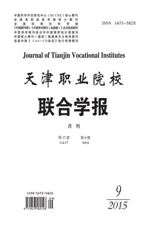否定词Not虚用和弱用
2015-02-13张国发
张国发
(天津商务职业学院,天津 300170)
否定词Not虚用和弱用
张国发
(天津商务职业学院,天津 300170)
英语否定词not是英语中表示否定的主要手段之一,但在特定的语言环境中却具有不同的用法和含义,尤其是与其他词语搭配时,其用法和表达意义更为复杂。本文现将否定词not虚用和弱用的一些用法归纳、总结、分述如下。
否定词not;虚用;弱用
一、not的虚用
下面的例句:
What Tom has suffered!汤姆受了怎样的苦!
What has Tom not suffered? 什么样的苦汤姆不曾受过呢?
第二句比第一句多了个否定词not,但两句的意思基本相同,作为否定词的not在句中并没有起到否定的作用。not的这种用法称为虚用,也叫做“多余的否定”(pleonastic negative)。下面谈谈not在句中虚用的场合。
(一)英语中的反意疑问句,如果陈述部分用肯定,附加的部分即用否定,但在祈使句中,反意疑问句中的疑问部分用肯定形式或否定形式都可以。例如:
Pass me the dictionary, won't you (=will you)? 请把字典递给我,好吗?
Comrades, be quiet, will you (=won't you)? 同志们,安静点,好吗?
Let's go for a swim , shall we (=shan't we) ? 我们游泳去,好不?
Let's do the work at once, shan't we (=shall we)? 我们说干就干,可好?
当然,用了not和不用not的句子虽然在意思上相似,但在语气上是有区别的:以肯定式(即不加not的句子)较为婉转。
(二)will和won't,do和don't在用来征求别人意见时,往往可以通用,表达相同的意思。例如:
Will (=Won't) you have a cup of tea? 喝杯茶好吗?
Don't (=Do) you like swimming? 你喜不喜欢游泳?
Won't (=Will) you stay a little longer? 请你多待一会儿好吗?
Will (=Won't) you have some more? 请再吃点?
(三)在修辞疑问句中(rhetorical question),“not”一词常表示“难道”的意思,而不含有否定的含义,肯定和否定的意思常常相似,试比较:
Haven't I told you to get ready? 难道我没有叫你做好准备?
Can't man change the nature? 人类不是可以改造自然吗?比较:Man can change the nature.人类可以改造目然。
这两句表达的意思相同,它们之间的区别与上面一样,也只是在语气上。
本文开头的 “What has Tom not suffered?”也是属于这种情况。类例:
What did that worker not suffer in those days?
那个工人在那些岁月里什么苦未受过!
(四)由if和whether引起的间接疑问句的宾语部分,not的虚用常见于宾语从句中,此时否定词not的用否意思并无变化。例如:
I asked him if I could not do anything for him。我问他我是否能帮他做点什么。(句中的 could not =could)
Try and think whether you have not any friends to help you.想一想是不是有什么朋友能帮助你。(句中的have not=have)
I should not wonder if it wasn't the gin again.那怕又是醋酒,我也不会感到惊 奇。(句中的wasn't=was)
I wonder if Mss. Grace is not woefully mistaken. (句中的is not=is)
该句意思相当于I wonder if Mrs. Grace is woefully mistaken.可译为: 我真想知道格雷斯夫人是否全然搞错了。不译作: 我真想知道格雷斯夫人是否不是全然搞错了。
(五)当疑问句转用作感叹句,称作 “exclamatory questions”,句中not的用否意思相同。表示感叹、赞赏、惊讶等感情色彩,表示说话人对某一种说法强烈的认同感。例如:
How many feet, I wonder, had not trodden that path! 不知有多少双脚走过了 那条小路!(句中的had not=had)
Wasn't it a marvelous concert! 那不是一次奇妙的演奏会吗!(=What a marvelous concert it was!)
Hasn't she grown! 她不是长大了吗!(=She has grown.)
Didn't I guarantee it would be all right! 我不是说过保险错不了吗?
How often have I not seen them coming back, tired as rats!
(“have I not seen…=…have I seen”) 有多少回我看见他们筋疲力尽地回来!
这种疑问句转用作感叹句时,后面可以用感叹号,也可以用问号。但应注意,符号不同句子的朗读音调也相异。试比较:——Isn't he kind? (升调) Isn't he kind !(降调) 译成汉语为:他难道不和气吗?!
(六)感叹句以if引导的特殊感叹句.以否定形式表示一种肯定的惊讶:
If that isn't what I want! 我想要的东西就是这个呀!
Oh,if it isn't wonderful! 啊,这可是好极了!
(七)有些单词,因为词义的解释不一样,not的用否并不影响原句的意思。试看;—Would you mind opening the window?
—Certainly. (or Certainly not.)
当回答certainly时,是针对问话人的请求而言,意为:Certainly I would open the window, 当回答certainly not时,是针对 mind而答的,意为:Certainly I wouldn't mind opening the window.
Excuse一词也有同样的情况,试比较:
He excused my going.
He excused my not going.
有了not的第二句和第一句意思一样,因为第一句中的excuse=dispense with(免除),而第二句中的excuse=pardon(原谅)。第一句说“免除我去”,第二句说“原谅我不去”, 二者意思相一致。
(八)hardly,scarcely,这两个词含有否定意思,有时加上not以后并不构成否定之否定,仍为否定,与不加not意思一样。试比较:
He doesn't seem hardly able to help me. (=He seems hardly able to help me.)
She cannot hardly have arrived yet. 她大概还没有到。
I can't scarcely keep me from going out. (=I can scarcely keep me from going out.)
He doesn't scarcely ever go to bed before midnight. 他很少在半夜以前就寝
二、not的弱用
在“He is a student.”和“He is not a student.”两句中,因为一句用了not,把“他是学生。”和“他不是学生。”两个意思表达得泾渭分明,是就是,不是就不是,毫不含糊。这儿not所表达的“不”的意思非常鲜明、十分强烈。但有时not虽有“不”的意思,含意并不强烈。在和表示全部的总括词搭配时,(以及与其他词构成固定搭配或习语时) not的否定意思削弱了,意为“并非一切……都是”或“一切……不都是”,例如“not all people意为“并非所有的人”,不是“所有的人都不”……。not的这种用法称为弱用,“Light Not”,常见于“部分否定”(partial negative)等结构中。例如:Some girls are not here.(暗含着:Some girls are here.)又如:2. All of them have not come. (暗含着:Some of them have come, while others have not.)
(一)not 用于部分否定句:
英语中表示全部的总括词主要有:all,both,every (及 everybody,everything, everywhere等派生词),always,altogether,entirely,wholly等。这些词和not的搭配在理解时很容易弄错。本文下面例举数例:
1.All is not gold that glitters. (=Not all that glitters is gold.)闪光的未必都是金子。(不是“闪光的都不是金子”。)
2. All of his plans are not pull into actions.他并没有把全部计划都付诸实施。不是“他的全部计划都未付诸实施。”
3.The teacher does not remember all the names of his students. 学生的名字老 师不是都记得。不是“学生的名字老师都不记得。”
4.Both the answers are not correct. 并不是两个答案都不对。(意为:One of the answers is correct, the other is not.“一个答案是对的,一个答案是不对的”。)不是“两个答案都不对”。(Neither of the answers is correct.)
又如:Both the proposals are not acceptable,(=Not both the proposals are acceptable. ) 这两项建议并非都可以接受。(意思是“一个可以接受,一个不可以接受。”比较:Neither of the proposals is acceptable. 这两项建议都不可接受。)
5.I don't like both of the brothers. 那俩兄弟我并不都喜欢。不是“俩兄弟我都不喜欢”。
又如:Both the brothers are here(兄弟两人都在这里)。若加否定词,句子就成为Both the brothers are not here,此句不可理解为两兄弟都不在这儿,而应理解为两兄弟并不都在这儿,意即一个在,一个不在这儿。要是两者都不在这儿,英语应该是这样表达的:Neither brother is here.
6.Every student is not diligent. 不是每个学生都是用功的。不是“每个学生都不用功”。
7.He didn't know everything about me.我的情况他并不完全知道。(比较:He didn't know anything about me.或He knew nothing about me.“我的情况他完全不知道”。)
8.He didn't always keep his words. 他并不是常常恪守诺言的。不是“他总是不恪守诺言”。
又如:I do not always believe what he says之句,不能理解为(I never
believe what he says. “我始终不相信他所说的话”。)应该是我并不是始终相信他所说的话,也就是说,我有时相信,有时不相信他的话。
9.My friend does not wholly agree. 我的朋友不是完全同意。不是“我的朋友完全不同意” 。
10.This is not altogether good. 那并不是都好。不是“那都不好”。
(二)Not在某些特殊结构和习语中的意义:
英语中构成否定句,not是个常用词,可是在下列含not的短语中,并没有否定的含义。例如:
as likely as not =probably可能,也许:
1. He'll be at home now,as likely as not.他现在可能在家。
2.He'll forget all about it as likely as not.他多半会将此事忘了。
as soon as not=most willingly很愿意,再乐意不过
1.I would go there as soon as not.我很愿意去那儿。
2.He would go as soon as not.他很乐意去。
as often as not (more often than not) =very frequently常常,往往,屡屡
1.During foggy weather the trains are late more often than not.有雾的时候,火车常常误点。
not but that (Not but what)=nevertheless;although虽然;虽然……但是
2.He is very strong—not but he will catch cold sometimes.
他虽然身体很强壮,但有时仍要感冒。
Not...but后面跟数词时,not but=only
1.I didn't bring but two. (=I only brought two.) 我只带了两个。
Not long ago,not unreasonably,not far away都含有否定词not,但并不表示否定。
1.Not long ago it rained.不久前下雨了。
2.Not unreasonably, one may expect results from him.
自然,希望从他那得到结果。
Can not—too, can not—over, can not—enough,这三个短语表示的意义相同。意为“无论……也不过分”“越……越……”。虽有否定词,却不是否定句。例如:
1.One can not be too careful.越小心越好。
2.He couldn't get home fast enough.他恨不得马上到家。
Can not but do ( Can not help but do=have to,属美语用法。)意为“不得不,不能不”,可换为have to do
1.I can not but agree.那我只好同意了。
2.One can not but be struck by that.任何人也不能不为之所感动。
Can not help doing“情不自禁……”
1.I can not help thinking of my sister whenever I see the little girl. 每当我看见这个女孩时就情不自禁地想起了我妹妹。
2.We can not help admiring his courage.对于他的勇气我们不胜佩服。
在意义上,not so much—as—结构表示选择比较,常常译为“与其说……不如说……,”例如:
1.He is not so much a writer as a reporter.
他与其说是位作家,不如说是位记者。
2.Her success was not so much by chance as by diligence.
她的成功与其说由于机遇不如说是由于勤奋。
受固定搭配的影响,如“not”本来表示否定,而“not only... but also...”不再有否定含义。例如:
1.She has not only knowledge, but also experience.她既有知识,又有经验。
2.He not only write to her but also send her some money.他不但给她写信,而且给她寄了钱。
除了上述形式外,比如英语里常用的词组(1) not for nothing并非没有酬劳,结果,收获。例如: It was not for nothing that he spent three years studying the subject. (花了三年的时问研究这个题目,并非毫无收获。意思是有收获,但并不是达到了全部预期结果。(2) not...and这种句型也是一种“部分否定”,例如: She cannot write and read. 她会读,但不会写。试比较:She cannot write or read. 她不会读,也不会写。
not弱用时在句中的位置。
《英语分类句型》(雷馨编著,1979年商务版)p.10上说,按英语的习惯与其将not置于all,every等词的前面,还宁愿将not置于谓语当中,因此,“Every man can not do it.”比“Not every man can do”要更加正确。也就是说,not应与谓语动词放在一起为好。
英国语言学家H. W.Fowler在他的A Dictionary of Modern English Usage pp.382-383上仅举两例:
All is not gold that glitters
Every land does not produce everything.并非每个国家什么都生产。
Fowler认为,严格地说来,第一句可改成:Not all is gold that glitters或Not all that glitters is gold,第二句可改成:Not every land produce everything,因为从逻辑上说,not是否定all和every的,并不是否定动词。他还认为,用“all…not”来代替“not all”虽合乎习惯,但这种结构可能会消失。
当然,not的位置无论是位于句首还是置于谓语当中对我们说来并非紧要。问题是当我们碰到 “not all…”或“all…not”这一类句型时能注意到not的弱用,即部分否定,就算是抓住了问题的本质。
综上所述,否定词not在英语中运用十分广泛,稍不留意就会陷入理解的误区,但只要我们注意辨明否定之对象,否定之范围,否定之焦点,平时留心辨别并积累一些常用句型和固定表达方式,掌握英汉两种语言的差异,便可正确理解甚至灵活运用英语否定词not。本文仅从语法以及语义角度对否定词not的弱用和虚用加以分析论述,然而在实践中,其确切涵义往往要同具体语境相联系。不但要理解其表层意义,还应理解其内在的含义。
参考书目:
[1]雷馨编著.英语分类句型[M].北京:商务出版社,1979.
[2]葛传槼编著.英语惯用法词典[K].上海:上海译文出版社,2002.
[3]赵振才.英语常见问题解答大辞典[K].哈尔滨:黑龙江人民出版社,1998.
[4]李长忠,赵修臣.学英语规律手册[K].北京:中国书籍出版社,1999.
[5]张道真.实用英语语法[K].北京:外语教学与研究出版社,2003.
The Empty and Weak Usage of Negative Word Not
ZHANG Guo-fa
(TianjinBusinessVocationalCollege,Tianjin300170)
In English, the negative word not is one of the main means to express negation, but in specific language environment, it has different usage and meaning. Especially in the collocation with other words, its usage and expression meaning is more complicated. This article will summarize and analyze the empty usage and weak usage of the negative word not.
negative word not; empty usage; weak usage
2015-05-15
张国发(1955-),男,本科,教育硕士,天津商务职业学院英语讲师,主要从事高等职业教育商务英语及英语学科的教学与研究工作。
H314.1
A
1673-582X(2015)09-0123-06
